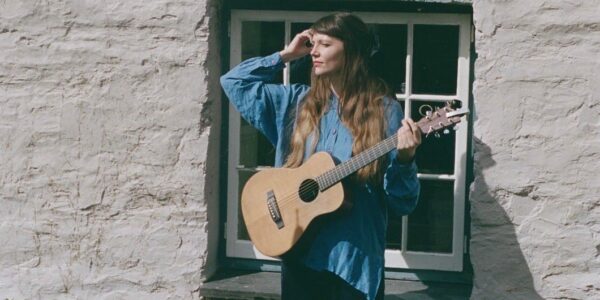Speculative Fiction, What Ifs and Making Things Up
05 Jan 2016 / General
Arvon tutors Joanna Kavenna and Liz Jensen on the pleasures and challenges of writing speculative fiction.Together there’ll be teaching the Speculative Fiction course at The Hurst on –
What does ‘Speculative Fiction’ mean and why did you choose this genre for your next Arvon course?
JK: To me ‘speculative fiction’ is a gloriously fluid and eclectic genre, which includes anything in which the conventions of literary realism are being tested. In a conventional realist novel you can’t create a parallel world, or metamorphose into a forest creature, or merge every character into a great pan-human super-being called ‘Wherim.’ But in speculative fiction you can, and much more besides. You can be very slightly speculative (‘What if there were no moon?’) or highly speculative (‘What if we were all living in the belly of an ancient sea beast, skulking at the bottom of the cosmic ocean, who is about to be fished into the net of a psychotic giant-goddess?’). So it is a versatile, exciting and constantly-evolving genre, and I think that makes it a great starting premise for a course.
LJ: ‘Speculative Fiction’ is the broadest church there is, which is one of the reasons I’m looking forward to teaching it at Arvon: there will be huge variety. My version of “speculative” always starts with the same question. It’s the question that Shakespeare, Swift, Wells, Huxley, Orwell, Asimov, Carter, Ballard, King, Murakami, Atwood, Mitchell and a thousand other wonderful writers all ask repeatedly: “What if?”. Ask it of anything that fascinates or puzzles you, and whole worlds start to unfold. It’s the simply the most stimulating question I know.
How important is research in speculative fiction writing?
JK: It depends utterly on the sort of novel you’re writing, and the sort of writer you are. The imagination is completely personal. If you’re the sort of writer who produces novels from the deep well of your psyche, without any research at all, then that’s great. If your novels usually emerge as a result of leafing through musty tomes in libraries, then that’s great too. ‘Research’ for writers can also involve informal enterprises such as overhearing conversations on buses, talking to people, and just, in general, being alive…It is a strange profession, in which no experience is wasted, and influences get buried, only to emerge decades later.
LJ: Research is a great springboard. But the truth is, I like building castles in the air. The imagination is a muscle: use it or lose it. So in some ways I am quite anti-research. My attitude is, write the story you want to write, then find the facts to fit it. Or twist them to fit it. Or if you can’t do that, just go ahead and make them up! I repeat, make them up. Your readers are there to enjoy a good story, and in fiction, everything’s allowed. That’s why it’s so liberating. It can take you anywhere and if you do it right, your readers will come with you. If your castle in the air appears rock-solid despite being a figment, then your fiction is doing its job.
In your experience as a both a tutor and a professional writer, what is the biggest challenge for speculative fiction writers and what is the first piece of advice you’d give to someone starting out?
JK: The major challenges include: Trying to find the time to write your first novel, commensurate with earning your living and looking after your family. Trying, then, to find a publisher who is sympathetic to your kind of writing. Trying to get the time to write your second novel, commensurate, still, with earning your living and looking after your family.
Finding a publisher for that novel, which might well be almost as hard as finding a publisher for your first novel – and so on… I’d say to anyone starting out: that you will encounter people along the way who tell you, with absolute certainty, that your kind of fiction ‘isn’t right for the market’ or, more strangely, that it just ‘isn’t right.’ These people are mere mortals, however; they cannot see into the future. They cannot determine, for all time, the precise parameters of what is ‘right’ and what is ‘good.’ So, it’s best to thank them for their advice, listen to any constructive and specific criticism, and politely ignore their wider prophecies of doom.
LJ: The biggest challenge for speculative fiction writers is rooting their “otherworlds” in the recognisable. You need the reader on board from the beginning. They must be able to feel, viscerally, that they are in a strange world – but not an alienating one. Creating plausible characters is crucial to this. It is all too tempting to let the ideas drive the fiction. But if the ideas have no fully-rounded flesh-and-blood representatives, champions and opponents, they will feel arid and theoretical.
What’s the first thing to bear in mind when trying to imagine a new civilisation from scratch?
 JK: A writer once told me, when I was starting out, that any imaginary civilisation must be rooted in the concerns of the real world, or it won’t convince a reader. I disagree. To me, one great thing about creating a new civilization is that you get to decide all the rules. It’s your civilization, and your imagination. So you can decide whether it is rooted in the concerns of the present-day real world, or whether it is rooted in the concerns of a world that you have invented as well. The first thing to bear in mind is that, in the world of your imagination, you are free.
JK: A writer once told me, when I was starting out, that any imaginary civilisation must be rooted in the concerns of the real world, or it won’t convince a reader. I disagree. To me, one great thing about creating a new civilization is that you get to decide all the rules. It’s your civilization, and your imagination. So you can decide whether it is rooted in the concerns of the present-day real world, or whether it is rooted in the concerns of a world that you have invented as well. The first thing to bear in mind is that, in the world of your imagination, you are free.
LJ: One of the most useful pieces of advice I heard when I was starting out as a writer was, “You can do anything you like.” I never forget that. So simple, so obvious, so crucial – and so easily forgotten. When I teach, I pass it on. Another tip is to think big. Be as extreme as you can. Flex that muscle.
Find out more and book a place on the Speculative Fiction course here.





